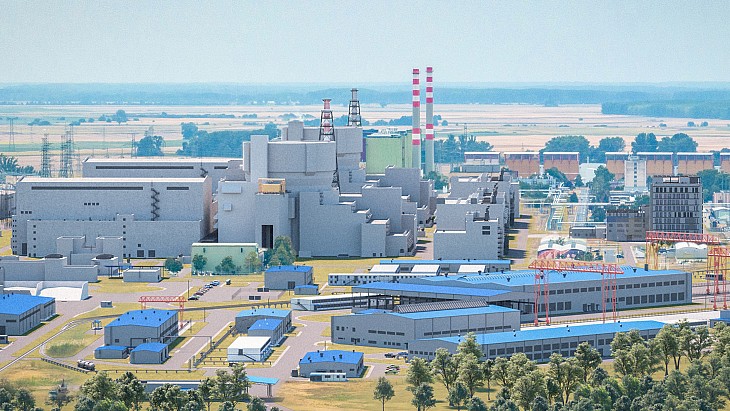The European Commission has approved the amendment of contracts "to speed up the investment" for the new Russian-built Paks II nuclear power project, Hungary's foreign minister Peter Szijjarto has said.

A rendering of how the plant might look (Image: Paks II)
Szijjarto said that Hungary and Russia had agreed last month to amend the construction and financing contracts, and these had been approved by the European Union on Wednesday.
The Paks II project company said: "Through the contract amendment, it will be possible for the Paks units to be put into service at the very beginning of the next decade, in compliance with the strictest safety standards."
It added that after the current preparatory site work and subject to the planning and licensing process, physical works can now begin at the site, with Szijjarto saying that "nuclear energy is the most able to guarantee protection from the uncertainties of the international energy market".
Many European Union countries have ended, or are in the process of ending, their nuclear energy links with Russia as a result of the war with Ukraine. Hungary, however, is pushing ahead with its project to install new nuclear capacity with Russia's Rosatom and has said it opposes the inclusion of nuclear in EU sanctions lists.
Details of the amendments to the contracts have not been published but Szijjarto said at the time they were signed that after going through "long negotiations", agreement had been reached on amendment of the construction and financing contract for Paks II, saying that even without the war and sanctions "life and the technological situation have changed so much" in the past nine years that the contracts would have needed amending.
The Paks II project was launched in early 2014 by an intergovernmental agreement between Hungary and Russia for two VVER-1200 reactors to be supplied by Rosatom, with the contract supported by a Russian state loan to finance the majority of the project. The application was submitted in July 2020 to construct Paks II alongside the existing Paks plant, 100 kilometres southwest of Budapest on the banks of the Danube river. Procedures allowed Hungary's National Atomic Energy Office 12 months to make its decision, with the possibility of extension by three months. That extension was triggered in July 2021, but the construction licence was issued more than a year later, in August 2022. In January this year, Hungary's Energy Minister Csaba Lantos said the Paks II plant was now expected to be completed in 2032.
The existing four units at Paks are VVER-440 reactors that started up between 1982 and 1987 and they produce about half of the country's electricity. Their design lifetime was for 30 years but that was extended in 2005 by 20 years to 2032 and 2037. In December, the Hungarian Parliament approved a proposal to further extend their lifespan, which means preparations can begin on operating the nuclear power plant into the 2050s.